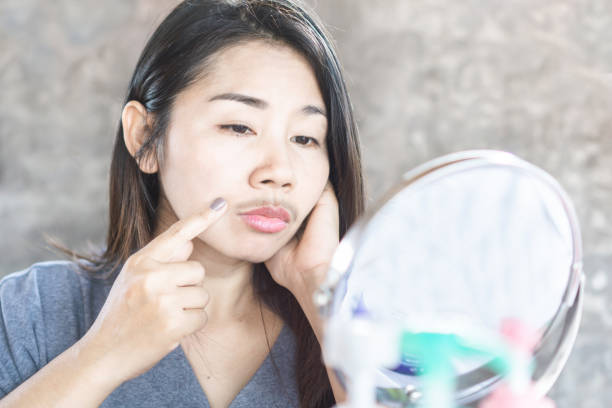
unhappy Asian woman having problem with mustache growing on face

Table of Contents
What is Hirsutism?
Hirsutism is a condition in women characterized by excessive, unwanted hair growth in areas typically seen in men, such as the face, chest, and back. It is commonly caused by an overproduction of androgens (male hormones), particularly testosterone. This condition can lead to emotional distress and may signal underlying health problems.
Types of Hirsutism
- Idiopathic Hirsutism: Hair growth occurs without any identifiable underlying cause.
- Androgenic Hirsutism: Caused by excess androgens due to conditions such as polycystic ovary syndrome (PCOS), adrenal gland disorders, or certain medications.
Causes
- Polycystic Ovary Syndrome (PCOS): A common cause due to hormonal imbalance.
- Congenital Adrenal Hyperplasia: A genetic disorder affecting hormone production.
- Cushing’s Syndrome: Excessive cortisol production can lead to increased androgen levels.
- Medications: Drugs like anabolic steroids, corticosteroids, or danazol.
- Tumors: Androgen-secreting tumors in the ovaries or adrenal glands.
- Obesity: Increases androgen production.
Signs and Symptoms
- Thick, coarse hair growth in areas such as the face, chest, back, and abdomen.
- Acne or oily skin.
- Irregular menstrual cycles (common with PCOS).
- Deepening of the voice or male-pattern baldness in severe cases.
- Emotional distress due to the physical appearance.
Risk Factors
- Family history: Hirsutism can run in families.
- Ethnicity: Women of Mediterranean, Middle Eastern, and South Asian descent are more likely to develop hirsutism.
- Obesity: Increases androgen production.
- Conditions like PCOS: Heighten the risk.
Prevention of Hirsutism
- Maintain a healthy weight: Helps regulate hormone levels.
- Regular exercise: Balances hormones and reduces insulin resistance.
- Manage stress: High stress can affect hormonal balance.
- Monitor medication: Be cautious with medications that increase androgen levels.
How to Diagnose
- Medical history: Assess symptoms and family history.
- Blood tests: Measure hormone levels.
- Imaging tests: Ultrasound or CT scans may be used to check for cysts or tumors.
How to Treat
- Medications:
- Anti-androgens: Spironolactone and flutamide reduce androgen production.
- Birth control pills: Help regulate hormones in women with PCOS.
- Eflornithine cream: Slows facial hair growth.
- Procedures:
- Laser hair removal: Permanent reduction in hair growth.
- Electrolysis: Destroys hair follicles to prevent growth.
For the treatment of hirsutism, various topical creams are used, often containing Eflornithine as the active ingredient. Below are some common brand names and their approximate prices in India:
1. Vaniqa Cream
- Active Ingredient: Eflornithine Hydrochloride
- Price: ₹1,800 – ₹2,500 for a 30g tube (Prices may vary based on location and discounts).
2. Eflora Cream
- Active Ingredient: Eflornithine Hydrochloride
- Price: ₹1,100 – ₹1,600 for a 15g tube.
These prices are approximate and can vary depending on the pharmacy, discounts, and availability. It’s best to consult a doctor before starting any treatment for hirsutism.
Home Remedies for Hirsutism
- Turmeric and gram flour paste: Applied to the affected areas to reduce hair growth.
- Spearmint tea: Known to lower androgen levels naturally.
- Sugar-lemon scrub: Helps in hair removal while exfoliating the skin.
Ayurvedic Medicine to Cure Hirsutism
- Shatavari (Asparagus racemosus): Helps balance hormones.
- Ashwagandha (Withania somnifera): Reduces stress and supports adrenal function.
- Kanchnar Guggulu: Used in Ayurveda for conditions like PCOS and to balance hormones.
- Triphala: Detoxifies the body and balances hormones.
Precautions
- Avoid using harsh chemical hair removal products.
- Test for allergies before using natural remedies.
- Consult a healthcare provider before starting any medications or herbal treatments.
Self-Care Tips
- Use gentle hair removal methods like waxing or threading.
- Maintain a healthy diet rich in antioxidants and fiber.
- Manage stress through yoga, meditation, or other relaxation techniques.
Conclusion
Hirsutism is a manageable condition often linked to hormonal imbalances. Through a combination of medical treatments, lifestyle changes, and natural remedies, many women can find relief from excessive hair growth. Early diagnosis and proper care can prevent complications and improve quality of life.
Disclaimer
This information is for educational purposes only and should not be used as a substitute for professional medical advice. Consult a healthcare provider for proper diagnosis and treatment.
Additional Tips
- Keep track of any changes in your menstrual cycle or other symptoms.
- Regularly consult with a doctor, especially if hirsutism is accompanied by other symptoms like rapid hair growth, voice deepening, or weight gain.
- Consider support groups or counseling if hirsutism is affecting your mental health.






